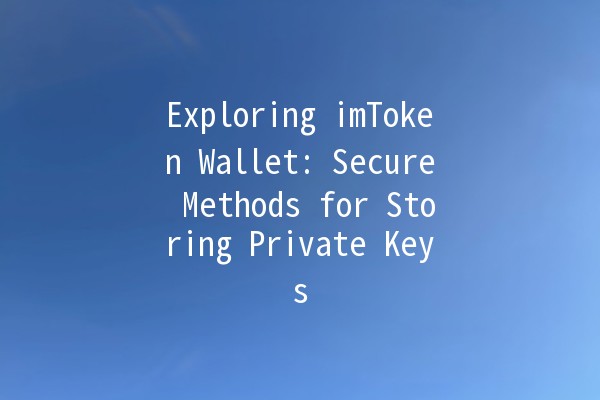In the rapidly evolving world of cryptocurrencies, the security of your assets is paramount. The imToken wallet is one of the most popular choices among crypto enthusiasts for storing and managing digital assets. A central feature of any crypto wallet is the private key, which allows users to access their cryptocurrencies. Mismanagement or exposure of these keys can lead to permanent loss of funds. Therefore, understanding the various methods for securely storing your private keys is crucial.
Before diving into the secure storage methods, let's first clarify what a private key is. A private key is a long string of characters that enables users to sign transactions and access their cryptocurrency. This key is not only essential for securing your assets but also plays a significant role in maintaining the integrity and authenticity of transactions conducted on blockchain networks.
The importance of private key security cannot be overstated. If someone gains access to your private key, they can control your funds and make unauthorized transactions. To illustrate, there have been numerous cases of theft where individuals lost millions because they failed to securely store their private keys. Consequently, if you own cryptocurrency, you must prioritize the security of your private keys.

Here are five effective strategies to enhance the security of your private keys in the imToken wallet:
What Are Hardware Wallets?
Hardware wallets are physical devices designed to securely store private keys offline. They are one of the most secure options available today for cryptocurrency storage.
Practical Application:
To use a hardware wallet:
Purchase a reputable hardware wallet: Brands like Ledger and Trezor are popular choices.
Set it up: Follow the manufacturer’s instructions to initialize the device.
Transfer assets from your imToken wallet: Send your cryptocurrencies from the imToken wallet to the address provided by your hardware wallet.
This method keeps your private keys offline and away from potential online threats.
What Are Paper Wallets?
A paper wallet is a physical printout of your public and private keys. It is an offline method that helps you keep your cryptocurrencies secure.
Practical Application:
To create a paper wallet:
Select a trusted service: Use websites like WalletGenerator.net or Bitaddress.org while being cautious of online threats.
Generate your keys: Follow the instructions on the site to create your wallet.
Print the wallet safely: Make sure to print it in a secure offline environment to prevent exposure to malware and hacking attempts.
Store the paper wallet securely: Keep it in a safe, fireproof, and waterproof location.
Paper wallets are incredibly secure as they are not connected to the internet.
What Is 2FA?
Twofactor authentication adds a layer of security by requiring an additional verification step during login, typically on a mobile device.
Practical Application:
To enable 2FA:
Setup 2FA on your imToken Wallet: In the app settings, enable the option for 2FA.
Choose your method: Use an authenticator application like Google Authenticator or Authy.
Complete the verification process: Follow the prompts to finalize 2FA activation.
By enabling 2FA, even if someone obtains your password, they would still need the second factor to access your wallet.
What Are Encrypted Backups?
An encrypted backup is a secure copy of your private keys that is protected by encryption, ensuring that even if someone gains access to the backup, they cannot use it without the decryption key.
Practical Application:
To create an encrypted backup:
Export your keys securely: Use your wallet’s export function to create a backup of your private keys.
Encrypt the backup: Use software like VeraCrypt or BitLocker to encrypt the backup file.
Store it securely: Keep the encrypted backup on a USB drive or a secure cloud service.
In case of loss of your hardware or software wallet, an encrypted backup helps you restore access without compromising security.
Why Regular Updates?
Updating your wallet application can protect you from newly discovered vulnerabilities. Developers often release updates to patch security flaws and improve overall wallet performance.
Practical Application:
Keep track of updates: Regularly check for updates from the imToken team on their official website or app store.
Update your application: Follow the instructions to install updates promptly.
By keeping your wallet updated, you ensure that you take advantage of the latest security features.
Educate Yourself Continually: The cryptocurrency landscape is continuously changing. Stay updated on the latest security practices and threats.
Beware of Phishing Attacks: Always verify URLs before entering your credentials. Phishing attacks are a common method used to steal private keys.
Each method discussed above plays a vital role in securing your imToken wallet. Implementing these strategies will significantly reduce the chances of losing access to your cryptocurrencies.
Losing your private key means losing access to your cryptocurrency assets permanently. Without the private key, you cannot sign transactions or transfer your assets.
Storing your private key on your computer is generally not safe unless it is heavily secured. If your computer is connected to the internet, it is vulnerable to hacking.
Yes, using multiple storage methods is a good practice. For example, you can store one copy in a hardware wallet and another as a paper wallet.
If you think your private key may have been compromised, immediately transfer your assets to a new wallet with a different set of keys.
Yes, various mobile applications offer enhanced security features, such as biometric authentication and encrypted backups. Always ensure that you download apps from trusted sources.
Store your paper wallet in a secure location, such as a safe or safety deposit box, and consider making multiple copies stored in different locations.
Implementing rigorous security measures is vital for any cryptocurrency owner. By utilizing hardware wallets, paper wallets, twofactor authentication, encrypted backups, and keeping your applications updated, you can significantly enhance the security of your private keys in the imToken wallet. Remember, the safety of your digital assets is ultimately in your hands.